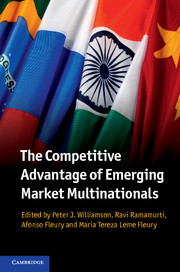Book contents
- Frontmatter
- Contents
- List of figures
- List of tables
- Notes on contributors
- Acknowledgements
- Introduction
- Part I Innovation and competitive advantage
- Commentaries on Part I
- Part II Value-chain configuration and competitive advantage
- Commentaries on Part II
- Part III Mergers and acquisitions and competitive advantage
- 9 Cross-border M&A and competitive advantage of Brazilian EMNEs
- 10 Cross-border M&A and competitive advantage of Russian EMNEs
- 11 Cross-border M&A and competitive advantage of Indian EMNEs
- 12 Cross-border M&A and competitive advantage of Chinese EMNEs
- Commentaries on Part III
- References
- Index
11 - Cross-border M&A and competitive advantage of Indian EMNEs
Published online by Cambridge University Press: 05 April 2013
- Frontmatter
- Contents
- List of figures
- List of tables
- Notes on contributors
- Acknowledgements
- Introduction
- Part I Innovation and competitive advantage
- Commentaries on Part I
- Part II Value-chain configuration and competitive advantage
- Commentaries on Part II
- Part III Mergers and acquisitions and competitive advantage
- 9 Cross-border M&A and competitive advantage of Brazilian EMNEs
- 10 Cross-border M&A and competitive advantage of Russian EMNEs
- 11 Cross-border M&A and competitive advantage of Indian EMNEs
- 12 Cross-border M&A and competitive advantage of Chinese EMNEs
- Commentaries on Part III
- References
- Index
Summary
Introduction
Why did Indian firms make foreign acquisitions and how has that affected their competitive advantage at home and abroad? By way of answer, this chapter offers two propositions.
The first is that Indian firms, compared to Brazilian, Chinese, or Russian firms (which make up the BRIC countries), seem to have relied more heavily on firm-specific advantages (FSAs) than country-specific advantages (CSAs) for their international competitive advantage. In terms of CSAs, India is not richly endowed with natural resources like Brazil or Russia, nor blessed with a competent government that creates a business environment in which firms can thrive internationally, as in China. It is sometimes said that Chinese firms have thrived because of the state while Indian firms have thrived in spite of the state (Das, 2006). In Rugman’s CSA–FSA framework (Rugman, 2009), CSAs include natural endowments such as land, natural resources, labour, location, climate and so on, and FSAs consist of firm-level assets and capabilities that contribute to competitive advantage. To this scheme, one might add a third category of advantages labelled ‘government-specific advantages’ (GSAs) to capture the quality of government-created assets, such as a country’s physical infrastructure, human capital and the quality of governance, reflected in the competency of policy makers to fashion and implement effective policies, including industrial targeting. Although Rugman would probably regard GSAs as a subset of CSAs, it is helpful and meaningful to distinguish natural endowments from volitional acts of government that contribute to the international competitiveness of firms.
- Type
- Chapter
- Information
- The Competitive Advantage of Emerging Market Multinationals , pp. 239 - 259Publisher: Cambridge University PressPrint publication year: 2013
- 9
- Cited by



